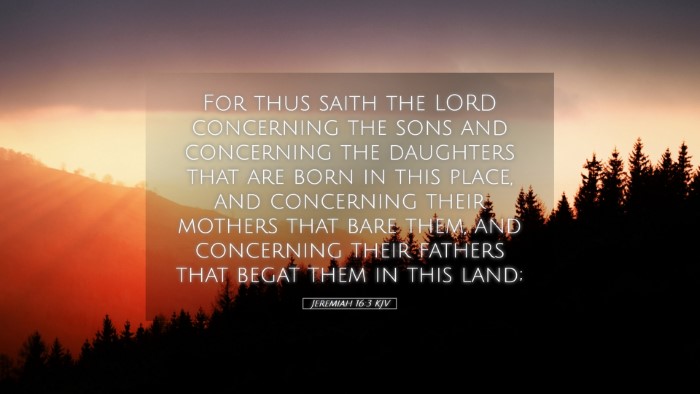Commentary on Jeremiah 16:3
Contextual Overview: Jeremiah 16:3 is a part of a profound prophetic warning issued by God through the prophet Jeremiah. At this juncture in the book, God seeks to clarify the fate of His people amidst impending judgment. This verse specifically addresses the calamities that will befall Jerusalem due to their persistent idolatry and lack of repentance.
Text of Jeremiah 16:3
"For thus saith the Lord concerning the sons and concerning the daughters that are born in this place, and concerning their mothers that bare them, and concerning their fathers that begat them in this land."
Interpretation of the Verse
This verse signifies God's awareness and concern for not only individuals but families and the generational implications of sin. The repetition of the terms "sons," "daughters," "mothers," and "fathers" serves to highlight the full spectrum of familial relationships affected by the prevailing sinfulness of the people.
Insights from Matthew Henry
- Generational Accountability: Matthew Henry points out that the sins of the parents have repercussions for their children. God’s judgment is not limited to individual acts of sin but extends to entire families, underlining a principle of generational accountability.
- The Call to Repentance: Henry emphasizes that God’s warnings, including through Jeremiah, aim for the people's repentance. This prophetic message serves as both a prediction of judgment and an urgent call to turn back to God.
- Compassion amidst Judgment: Henry illustrates God's compassionate nature; despite the impending doom, God desires His people to recognize the gravity of their actions before the final judgment strikes.
Insights from Albert Barnes
- Divine Foreknowledge: Barnes observes that this declaration demonstrates the divine foreknowledge of God regarding the suffering that would befall future generations due to their actions. He points out that God is aware of the impact sin has, not just in the present but also in future familial lines.
- Nature of Punishment: Barnes notes that the punishment indicated would reflect the seriousness of the sins committed by the parents, highlighting the principle that the consequences of sin are often experienced collectively in familial units.
- Prophetic Responsibility: He emphasizes the critical role of the prophet in conveying such messages, presenting the need for Jeremiah, as a faithful messenger, to declare these judgments openly and without reservation.
Insights from Adam Clarke
- Societal Impact of Sin: Adam Clarke stresses that the sins of individuals within a community have a broader societal impact. The familial implications of sin reflect on the state of the entire nation, illustrating that collective moral decline leads to national judgment.
- God's Omniscience: Clarke highlights God's omniscience in understanding human relationships deeply, expressing that His warnings are rooted in an intimate understanding of communal and familial dynamics.
- Warnings Against Spiritual Complacency: Clarke warns that God's mercy does not negate the seriousness with which He views persistent disobedience, illustrating that taking God's grace for granted results in severe consequences.
Theological Reflections
This verse provides significant theological reflections that are relevant across various contexts:
- Understanding Sin: It underscores the reality that sin is not merely individual but communal, affecting families and communities.
- God’s Justice and Mercy: The juxtaposition of judgment and divine desire for repentance should inspire both reflection and worship. It portrays a God who is just, yet merciful, striving to draw His people back into a right relationship with Him.
- The Role of the Prophet: This underscores the importance of prophetic voices in guiding and warning communities of the consequences of falling away from God's commandments.
Application for Today
This passage holds great significance for modern readers, particularly leaders, pastors, and scholars:
- Children and Families: There is a call to recognize the implications of sin within familial structures. Parenting should be approached with the awareness that actions and spiritual decisions have lasting impacts on descendants.
- Community Responsibility: The communal nature of sin informs how congregations should address moral issues, emphasizing collective responsibility in spiritual leadership.
- Encouragement to Repentance: Just as Jeremiah’s message was a call to turn back, contemporary applications require believers to encourage one another toward repentance and renewed faith in God.


